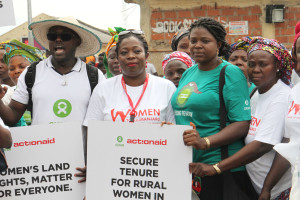Towards ensuring that women in rural areas are empowered particularly in the area of agriculture, an international organisation committed to the eradication of poverty, Oxfam, has said that it will engage Nigerian government and businesses to provide secured access to land for smallholder female farmers.

Oxfam lamented that such women often do most of the work on the land but face the “biggest battle to call the land their own.”
Speaking in Abuja recently at an event organised by Oxfam Nigeria and ActionAid to mark this year’s International Women’s Day and the launching of Kilimanjaro Initiative, Head of Programme, Oxfam Nigeria, Constant Tchona, called for the reform of the Land Use Act to make communities take ownership of their land.
He also advocated against all cultural barriers to women’s rights to land and inheritance in Nigeria.
“Oxfam Nigeria will continue to support the Nigerian women small scale farmers in line with our vision of a secure and prosperous Nigeria, where the benefits from economic growth are shared so that the basic needs of all people are met; where rights of women are respected; where all people, especially the youth, can participate in decision making and influence the policies that impact on their lives and where public and private sector institutions are accountable and transparent,” he said.
Tchona further said that women in Nigeria and other West Africa countries still face three major challenges which, according to him, are equity in and secure access to land, safety of operating and investment by women, and protection and preservation of women’s land rights.
Women, he explained, are the first victims of land and related natural resources grabbing, noting that these and other issues threaten the capacity of communities to meet the challenges of sustainable agricultural and food systems today and in the future.
“Women do not only play major roles in cash crops, staple food production, processing or marketing; but as holders of local and traditional knowledge in farm seed conservation and natural resources management, they also play a critical role in the transmission of traditional knowledge to future generations.
“That is why we in Oxfam are advocating that women should be leaders in the transition to sustainable agricultural and food systems,” he said.
